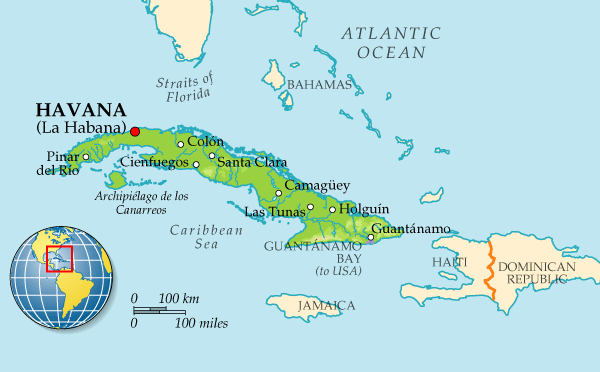Population : 11 224 321 habitants (est. 2002)
Pays voisins : Aucun
Densité : 101.25 hab./km²
Superficie : 110 860 km²
Capitale : La Havane
Principales villes : Santiago de Cuba, Camagüey, Holguín, Guantanámo, Santa Clara, Bayamo, Cienfuegos, Pinar del Rio, Las Tunas
Point culminant : Pico Turquino 1 994 m.
Langue(s) parlée(s) : Espagnol
Langue(s) officielle(s) : Espagnol
Monnaie : Peso
Fête nationale : 10 décembre

La inscripción para el "World Directory Blogspot" son gratuitas. Envía tu blog Para más establecer relaciones entre diferentes países! Imperativo para seguir nuestro blog para validar su registration.Thank por su comprensión
Las personas que deseen ayuda me contrató para la expansión de este sitio tienen esta placa



Pays voisins : Aucun
Densité : 101.25 hab./km²
Superficie : 110 860 km²
Capitale : La Havane
Principales villes : Santiago de Cuba, Camagüey, Holguín, Guantanámo, Santa Clara, Bayamo, Cienfuegos, Pinar del Rio, Las Tunas
Point culminant : Pico Turquino 1 994 m.
Langue(s) parlée(s) : Espagnol
Langue(s) officielle(s) : Espagnol
Monnaie : Peso
Fête nationale : 10 décembre

La inscripción para el "World Directory Blogspot" son gratuitas. Envía tu blog Para más establecer relaciones entre diferentes países! Imperativo para seguir nuestro blog para validar su registration.Thank por su comprensión
Las personas que deseen ayuda me contrató para la expansión de este sitio tienen esta placa
In 1492, Christopher Columbus landed on and claimed the island now occupied by Cuba, for the Kingdom of Spain. Cuba remained a territory of Spain until the Spanish–American War ended in 1898, and gained formal independence from the U.S. in 1902. A fragile democracy, increasingly dominated by radical politics eventually evolved, solidified by the Cuban Constitution of 1940, but was definitely quashed in 1952 by former president Fulgencio Batista, and an authoritarian regime was set up, intensifying and catalyzing already rampant corruption, political repression and crippling economic regulations. Batista was ousted in January 1959 by the July 26 movement, and a new administration under Fidel Castro established, which had by 1965 evolved into a single-party state under the revived Communist Party of Cuba, which holds power to date.
Cuba is home to over 11 million people and is the most populous island nation in the Caribbean, as well as the largest by area. However, the population density is lower than in most Caribbean countries. Its people, culture, and customs draw from diverse sources, such as the aboriginal Taíno and Ciboney peoples, the period of Spanish colonialism, the introduction of African slaves and its proximity to the United States.
Cuba has a 99.8% literacy rate, an infant death rate lower than some developed countries, and an average life expectancy of 77.64.





